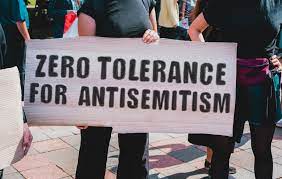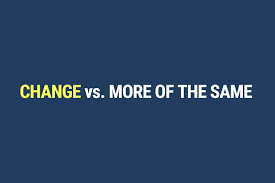The scourge of human history is anti-Semitism.
The history of homo sapiens is pockmarked with epic events of inhumanity and eras of blinding intolerance, but as events and eras ebb and flow, the durability of hatred of the Jews is a strain that refuses to die.
It is a virus that defies the cures of logic and knowledge, mutating into new and ignominious forms always toxic and virulent.
It persists today in our country where anti-Semitic instances reached new levels in 2022 and have climbed by 400% this year. Orthodox Jews have been attacked and spit on, Jewish children are afraid of wearing yarmulkes, college students endure chants encouraging their deaths, and the constant fear of attack produces the suffocating feeling of being a stranger in their own country.
No Tolerance for Intolerance
Let’s be clear. Criticisms of the Israeli government policies are not the same as anti-Semitism. After all, a significant percentage of American Jews have criticized those policies themselves.
Protesting in favor of Palestine is not prima facie anti-Semitism and is protected by the First Amendment because of defenses over the decades by Jewish lawyers like David Goldberger, Louis Brandeis, Floyd Abrams, Bob Herman, Glenn Greenwald, and others.
That said, we can debate, demonstrate, and disagree, but we should loudly and persistently condemn any of it that devolves into anti-Semitism. We all know the difference between free speech and hate and violent speech, so we have an obligation to call out the latter regardless of our political positions and personal opinions.
People who march around in neo-Nazi garb shouting Nazi slogans dishonor the price Jews paid from German bigotry but also our fathers and grandfathers’ sacrifices in World War II to fight Hitler and Nazism. Those who speak in similar terms rooted in fanatism spewing hate are not just uninformed, they are un-American.
Jewish Contributions Everywhere
Jews have always comprised a small percentage of the world population, particularly considering that more than six million were murdered by the Nazis.
Despite that, Jews have always punched above their weight. They only account for about 2.4% of the population of the U.S., but their contributions are considerable – in the law, literature, music, theater, movies, medicine and medical research, culture, civil rights, and every aspect of American life.
The evidence of that fact for me in just the last 24 hours includes George Gershwin’s Rhapsody in Blue, Timothee Chalamet on SNL created by Lorne Michaels, music by Bob Dylan and Leonard Cohen, a preview of a movie about Leonard Bernstein, a radio interview with neurologist and author of Awakenings Oliver Sacks, an excerpt of Barbara Streisand reading her recently published book, and a documentary about Albert Brooks made by Rob Reiner that included interviews with Steven Spielberg, Judd Apatow, Larry David, Sarah Silverman, and Ben Stiller.
It’s enough to remind me what the world would be like without the Jewish contributions that make it dramatically more enjoyable, enriching, and engaging.
An Outsized Impact
The number of Jews in the Memphis region is about 10,000, or 7/10ths of 1%. But just as Jews have done in the U.S., this small minority has shown an outsized impact with their leadership and generosity to civic and charitable organizations.
They have been instrumental in the history of downtown, the development of the business community, and influential in government affairs.
It’s a relationship that dates back to the earliest days of Memphis, a Western frontier town named only 19 years before it had its first known Jewish resident. David Hart owned Hart’s Inn and Saloon in the Pinch District on the north side of Adams between Front and Main Street. A few years later, he was followed by Hayme Solomon, who became a successful merchant, cotton broker, and city alderman.
Later, there would be Benedict Lowenstein and Jacob Goldsmith whose retail stores ultimately led to the city’s preeminant department stores. Henry Seessel’s peddling business grew into a successful grocery store.
Over the years, these early Jewish names were joined by Cooper, Belz, Gerber, Lightman, Sharff, Shainberg, Grinspan, Dreifus, Plough, Korones, Alperin, Scheidt, Feibelman, Herff, Moss, Waldauer, Burson, Allenberg, Fogelman, Adler, Halperin, Levy, Loewenberg, Hanover, Bearman, Halle, Lichterman, Goodman, Margolin, Hohenberg, Kopald, Weinberg, Orgel, and Cantor, to name only a few.
Fighters for Social Justice
These are names that every Memphian should know because they are central to the proudest chapters in the city’s history. It is in this way that an anti-Semitic attack is not just an assault on Memphis Jews, but Memphis itself.
Along with my dear friend, Susan Adler Thorp, I was involved in the recent exhibition at Temple Israel paying tribute to Rabbi James Wax who fought relentlessly for social justice and equal rights from 1954 to 1978. He famously rebuked Memphis Mayor Henry Loeb on national television for the politician’s culpability in the murder of Dr. Martin Luther King Jr. He also was on the committee that quietly desegregated all public facilities in Memphis while the Jewish owners of the city’s largest department stores were doing the same.
He built on a tradition that dated back to Temple Israel Rabbi William H. Fineshriber, who risked everything to be an outspoken critic of lynching and the Ku Klux Klan in early 20th century Memphis, and in the 1960s, Rabbi Arie Becker of Beth Shalom synagogue marched with Dr. King in Birmingham, leading to death threats that forced him out of the city. It’s a commitment to civil rights and a better Memphis that continues today with Temple Israel Rabbi Micah Greenstein.
Meanwhile, also in the Sixties, Myra Dreifus fought for free school lunches for poor children and successfully convinced the school district to levy a special tax to fund them. She also convinced city government to fund a summer jobs program.
The list of names arguably should include Presley whose “Memphis Mafia” had four Jewish members – Alan Fortas, George Klein, Marty Lacker, and Larry Geller. Presley had acted as a Shabbos goy when he lived in public housing and later in life, he wore a pendant with the Hebrew Letter, “chet and yod,” spelling out the Hebrew word for life. A cousin said a maternal ancestor was Jewish. When his mother died, he designed a headstone with a Christian cross and a Jewish Star of David.
The Mantra
Last week marked the 85th anniversary of Kristallnacht in Germany when Jewish homes, businesses, and synagogues were looted and burned and about 30,000 Jewish men were arrested. A month later, all Jewish businesses were banned.
In the midst of a surge in anti-Semitism and the troubling allure of authoritarianism to many, what was once unimaginable in America is more and more comprehensible. It is a frightening time for all of us, so imagine how disturbing it is for Jews who have two millennia of experience that tells them how the unfathomable can become reality.
It’s why when it comes to anti-Semitism, all of us should join with our Jewish friends and neighbors and say emphatically: “Never again.”
It’s time for all of us to also add: “Enough is enough.”
***
Join us at the Smart City Memphis Facebook page and on Instagram for daily articles, reports, and commentaries that are relevant to Memphis.





You did not mention either of our two Jewish congressmen. Thank you for that since neither is deserving of being a part of the pantheon of former leaders you call out. Their most important issues seem to be working to be reelected, although I would say that Mr. Kustoff’s support for the crazy right, example Jim Jordan, probably makes the deceased roll over in their graves.